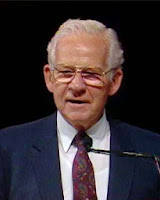"After His mortal ministry, Christ elevated the law of sacrifice to a new level. In describing how the law would continue, Jesus told his Nephite Apostles that He would no longer accept burnt offerings but that His disciples should offer 'a broken heart and a contrite spirit' (3 Ne. 9:19-20; see also D&C 59:8, 12). Instead of the Lord requiring our animals or grain, now He wants us to give up all that is ungodly. This higher practice of the law of sacrifice reaches into the inner soul of a person. Elder Neal A. Maxwell of the Quorum of the Twelve Apostles said: 'Real, personal sacrifice never was placing an animal on the altar. Instead, it is a willingness to put the animal in us upon the altar and letting it be consumed!' ("'Deny Yourselves of All Ungodliness,'" Ensign, May 1995, 68).
"How is it we show the Lord that we have symbolically put ourselves upon today's sacrificial altar? We show Him by living the first great commandment: 'Thou shalt love the Lord thy God with all thy heart, and with all thy soul, and with all thy mind' (Matt. 22:37). When we overcome our own selfish desires and put God first in our lives and covenant to serve Him regardless of the cost, we are then living the law of sacrifice.
"One of the best ways to be sure we are keeping the first great commandment is to keep the second great commandment. The Master Himself taught that 'inasmuch as ye have done it unto one of the least of these my brethren, ye have done it unto me' (Matt. 25:40) and that 'when ye are in the service of your fellow beings ye are only in the service of your God' (Mosiah 2:17). The degree of our love for the Lord and for our fellowman can be measured by what we are willing to sacrifice for them. Sacrifice is a demonstration of pure love."
- M. Russell Ballard, "The Law of Sacrifice," CES symposium at BYU, August 13, 1996; see Ensign Oct 1998, pp. 6-13
Click here to read the full talk
I like the description Elder Ballard uses—the old law of sacrifice wasn't replaced, but "Christ elevated the law of sacrifice to a new level." That emphasizes the link between the old requirements and the new. Elder Maxwell's statement brings that out beautifully:
Then Elder Ballard goes into the "how" of the process. We can best show God our obedience to the "new" law of sacrifice, and show our real and complete love for Him, by truly loving those around us. We demonstrate the depth of our love, for God and for our neighbors, by our willingness to sacrifice.



































